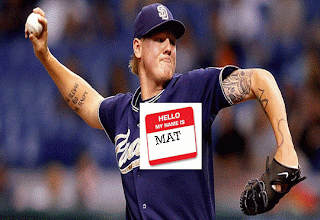With Scot Shields leaving us, who will carry the torch for baseball players with common first names spelled in uncommon ways?
The question merits a list:
1) Jarrod Saltalamacchia C, Red Sox
The last name gets all the attention, but “Jarrod” ain’t exactly normal. If I were a bully in Jarrod’s third grade class I would separate the two syllables and call him Jar-rod. It wouldn’t mean much, except that they’re both English words and I would say it in a mocking tone, like “How’s your jar of rods, Jar-rod?” Then I would run for cover because presumably a third grade version of Jarrod Saltalamacchia could kick my ass.
Conclusion: I would make a terrible bully.

Thursday, March 31, 2011
Tuesday, March 29, 2011
Mike Hampton and the Crash
In the simplest terms, Mike Hampton was a good pitcher.
He won 148 games over 15 major league seasons and, for a precious few years, ranked among the top left-handed starters in baseball. He helped the Mets to the 2000 National League Pennant, won 22 games for the Astros in 1999, and carried an ERA under 4.00, while throwing 150+ innings for six consecutive seasons (1995-2000) during baseball’s most home-run-happy era.
You'll hear little talk of those accomplishments in the days following his retirement announcement.
Friday, March 25, 2011
Scot Shields and Fallen Angels
In his waning years Scot Shields had all the markings of a player nearing retirement: aging body, nagging injures, consecutive years of statistical regression. So when the the versatile reliever -- who spent all ten of his major league seasons with the Anaheim/Los Angeles Angels (of Anaheim) -- hung ‘em up this past weekend, it came as little surprise.
The decision, predictable as it was, signified the final flash of a passing era. As Jeff Sullivan of SB Nation points out, Shields was the last remaining player from the Angels’ 2002 title-winning team still on LA’s roster. Couple that with the recent retirement of fellow Angel reliever Brendan Donnelly and franchise hit leader Garret Anderson, and one can sense the ‘02 Angels receding quickly into the annals of baseball lore.
The decision, predictable as it was, signified the final flash of a passing era. As Jeff Sullivan of SB Nation points out, Shields was the last remaining player from the Angels’ 2002 title-winning team still on LA’s roster. Couple that with the recent retirement of fellow Angel reliever Brendan Donnelly and franchise hit leader Garret Anderson, and one can sense the ‘02 Angels receding quickly into the annals of baseball lore.
Wednesday, March 23, 2011
Brendan Donnelly: Bonus List!
A partially-researched list of notable bespectacled hurlers:
1) Eric Gagne
No amount of goggles could ever persuade me to pronounce his name the french way. Hear me now Eric Gag-knee, I shall heckle you in my native tongue.
2) Brandon League
He’s become such a celebrity in the Seattle area that locals have taken to substituting his first name for his last in normal conversation as in, "She's out of my Brandon" or "20,000 Brandons under the sea."
Correction...no one does this.
3) Duaner Sanchez
Officially recognized as world’s most successful person named Duaner.
1) Eric Gagne
No amount of goggles could ever persuade me to pronounce his name the french way. Hear me now Eric Gag-knee, I shall heckle you in my native tongue.
2) Brandon League
He’s become such a celebrity in the Seattle area that locals have taken to substituting his first name for his last in normal conversation as in, "She's out of my Brandon" or "20,000 Brandons under the sea."
Correction...no one does this.
3) Duaner Sanchez
Officially recognized as world’s most successful person named Duaner.
Gary Sheffield and Shadows
Gary Sheffield accomplished nearly everything a professional baseball player could accomplish in his 22-year career. He appeared in nine all-star games, hit 509 home runs, won five silver sluggers (including three in a row), and won a world championship with the 1997 Marlins.
Why then does he feel like a footnote, a bridesmaid, a perpetual second fiddle?
When he officially retired on February 17th, more than a full year after his final game, the news bulletin read like an afterthought. I thought he’d already retired. Or maybe he was injured. Or maybe he was asking for a trade. It was a bizarre anticlimax for a player whose on-field accomplishments and off-field tribulations should have enraptured us.
But they didn’t, and it’s hard to figure.
Why then does he feel like a footnote, a bridesmaid, a perpetual second fiddle?
When he officially retired on February 17th, more than a full year after his final game, the news bulletin read like an afterthought. I thought he’d already retired. Or maybe he was injured. Or maybe he was asking for a trade. It was a bizarre anticlimax for a player whose on-field accomplishments and off-field tribulations should have enraptured us.
But they didn’t, and it’s hard to figure.
Friday, March 18, 2011
Brendan Donnelly and Charles Dickens
There are those rare players who, in an understated sort of way, come to embody an era in baseball history. They are not hulking giants in the mold of Ruth or DiMaggio, but rather the laymen whose career arcs seem to brush against the day’s defining story lines. Like a Dickensian protagonist, these characters have a symbolic anonymity, one that makes their careers compelling in a tale-of-the-times sort of way. Brendan Donnelly, who retired this past Wednesday after nine major league seasons, was one of those players.
Subscribe to:
Comments (Atom)
